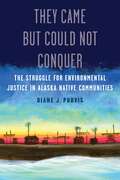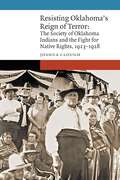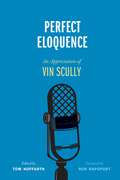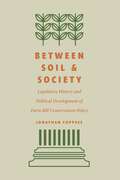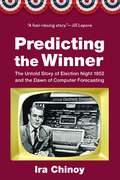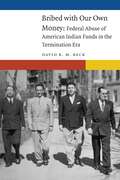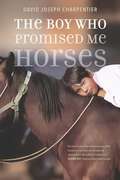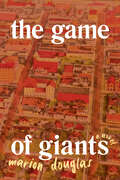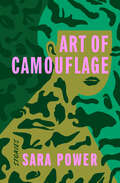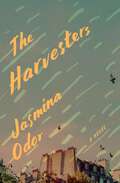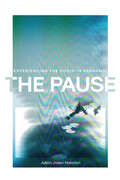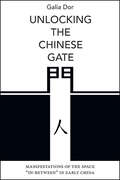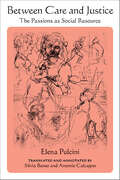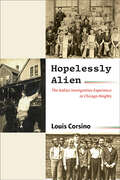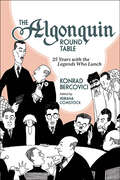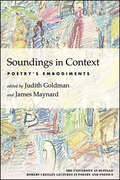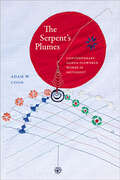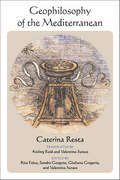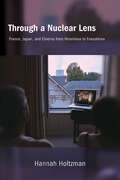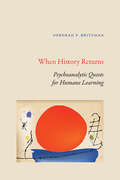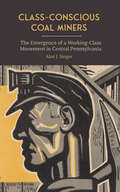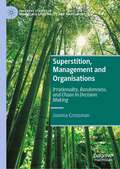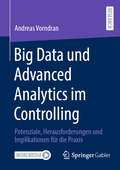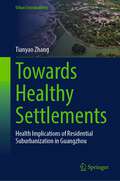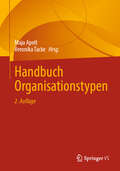- Table View
- List View
They Came but Could Not Conquer: The Struggle for Environmental Justice in Alaska Native Communities
by Diane J. PurvisAs the environmental justice movement slowly builds momentum, Diane J. Purvis highlights the work of Indigenous peoples in Alaska&’s small rural villages, who have faced incredible odds throughout history yet have built political clout fueled by vigorous common cause in defense of their homes and livelihood. Starting with the transition from Russian to American occupation of Alaska, Alaska Natives have battled with oil and gas corporations; fought against U.S. plans to explode thermonuclear bombs on the edge of Native villages; litigated against political plans to flood Native homes; sought recompense for the Exxon Valdez oil spill disaster; and struggled against the federal government&’s fishing restrictions that altered Native paths for subsistence. In They Came but Could Not Conquer Purvis presents twelve environmental crises that occurred when isolated villages were threatened by a governmental monolith or big business. In each, Native peoples rallied together to protect their land, waters, resources, and a way of life against the bulldozer of unwanted, often dangerous alterations labeled as progress. In this gripping narrative Purvis shares the inspiring stories of those who possessed little influence over big business and regulations yet were able to protect their traditional lands and waterways anyway.
Resisting Oklahoma's Reign of Terror: The Society of Oklahoma Indians and the Fight for Native Rights, 1923–1928 (New Visions in Native American and Indigenous Studies)
by Dr. Joshua CloughThe oil and natural gas boom in pre–World War I Oklahoma brought unbelievable wealth to thousands of tribal citizens in the state on whose lands these minerals were discovered. However, as Angie Debo recognizes in her seminal study of the period, And Still the Waters Run, and, more recently, as David Grann does in Killers of the Flower Moon, this affluence placed Natives in the crosshairs of unscrupulous individuals. As a result, this era was also marked by two of the most heinous episodes of racial violence in the state&’s history: the Tulsa Race Massacre of 1921 and the Osage Murders between 1921 and 1925. In Resisting Oklahoma&’s Reign of Terror Joshua Clough details the responses of one largely forgotten Native organization—the Society of Oklahoma Indians (SOI)—to the violence and pillaging of tribal resources during the 1920s. Clough provides historical understanding of its formation and its shared values of intertribal unity, Native suffrage, and protection of Native property. He also reveals why reform efforts were nearly impossible in 1920s Oklahoma and how this historical perspective informs today&’s conflicts between the state and its Indigenous inhabitants. Through this examination of the SOI, Clough fills the historiographic gap regarding formal Native resistance between the dissolution of the national Society of American Indians in 1923 and the formation of the National Congress of American Indians in 1944. Dismissed or overlooked for a century as an inconsequential Native activist organization, the history of the SOI, when examined carefully, reveals the sophistication and determination of tribal members in their struggle to prevent depredations on their persons and property.
Perfect Eloquence: An Appreciation of Vin Scully
by Ron RapoportWhen Vin Scully passed away in 2022, the city of Los Angeles lost its soundtrack. If you were able to deliver a eulogy for him, what might it include? What impact did he have on you? What do you carry forward from his legacy? Sixty-seven essayists—one representing each season of his career calling games for the Los Angeles Dodgers, from 1950 through 2016—reflect on the ways his professional and private life influenced them. The contributions include a range of stories and remembrances from those who knew and followed him. The consensus of the contributions is that Scully&’s actions spoke louder than his well-recognized words. This collection includes fellow broadcasters as well as historians, players, journalists, celebrities, and others connected to the game of baseball, with each piece introduced by sports journalist Tom Hoffarth. Readers can consider Scully&’s life through common themes: his sincerity, his humility, his professionalism, his passion for his faith, his devotion to his family, his insistence on remembering and giving context to important moments in the history of not just the game but the world in general, all wrapped up in a gift for weaving storytelling with accurate reporting, fellowship with performance art, humor, and connection.
Between Soil and Society: Legislative History and Political Development of Farm Bill Conservation Policy
by Jonathan CoppessThe United States spends approximately $5 billion each year on federal programs designed to conserve natural resources and address the environmental consequences of modern agricultural production. Like farm policy, agricultural conservation policy is rooted in the Roosevelt administration&’s New Deal efforts of the 1930s. Farm conservation policy has waxed and waned since then, related to fluctuating economic and environmental concerns. In Between Soil and Society Jonathan Coppess traces the history and development of U.S. conservation policy, especially as it compares to and interacts with the development of farm policy. By answering questions about the differences in political support and development for these similar policy regimes, with efforts to apply legal and political theory to understand the differences, Coppess considers the implications of climate change and lessons for future policy development. One of the few books to make sense of the legal and economic analysis of agricultural conservation policy, Between Soil and Society provides a window into larger issues of American politics, governance, and policy development.
Predicting the Winner: The Untold Story of Election Night 1952 and the Dawn of Computer Forecasting
by Ira ChinoyThe history of American elections changed profoundly on the night of November 4, 1952. An outside-the-box approach to predicting winners from early returns with new tools—computers—was launched live and untested on the newest medium for news: television. Like exhibits in a freak show, computers were referred to as &“electronic brains&” and &“mechanical monsters.&” Yet this innovation would help fuel an obsession with numbers as a way of understanding and shaping politics. It would engender controversy down to our own time. And it would herald a future in which the public square would go digital. The gamble was fueled by a crisis of credibility stemming from faulty election-night forecasts four years earlier, in 1948, combined with a lackluster presentation of returns. What transpired in 1952 is a complex tale of responses to innovation, which Ira Chinoy makes understandable via a surprising history of election nights as venues for rolling out new technologies, refining methods of prediction, and providing opportunities for news organizations to shine. In Predicting the Winner Chinoy tells in detail for the first time the story of the 1952 election night—a night with continuing implications for the way forward from the dramatic events of 2020–21 and for future election nights in the United States.
Bribed with Our Own Money: Federal Abuse of American Indian Funds in the Termination Era (New Visions in Native American and Indigenous Studies)
by David R. BeckIn Bribed with Our Own Money David R. M. Beck analyzes the successes and failures of Indigenous nations&’ opposition to federal policy in the 1950s and 1960s. Focusing on case studies from six Native nations, Beck recounts how the U.S. government coerced American Indian nations to accept termination of their political relationship with the United States by threatening to withhold money that belonged to the tribes. Termination was the continuation—and, federal officials hoped, the culmination—of more than a century of policy initiatives intended to end the political relationship between Indian tribal nations and the federal government. Termination was also intended to assimilate American Indian individuals into the country&’s social and economic culture and to remove the remainder of reservation lands from federal trust. American Indians hoped to gain greater opportunities of self-governance and self-determination, but they wanted to do so under the protection of the federal trust relationship.Bribed with Our Own Money analyzes both successful and unsuccessful efforts of Native nations to oppose this policy within the larger context of long-standing federal abuse of tribal funds. It is the first book to view federal termination efforts grounded in bribery for what they were: a form of coercion.
The Boy Who Promised Me Horses
by David Joseph Charpentier&“He tried to outrun a train,&” Theodore Blindwoman told David Joseph Charpentier the night they found out about Maurice Prairie Chief&’s death. When Charpentier was a new teacher at St. Labre Indian School in Ashland, Montana, Prairie Chief was the first student he met and the one with whom he formed the closest bonds. From the shock of moving from a bucolic Minnesota college to teach at a small, remote reservation school in eastern Montana, Charpentier details the complex and emotional challenges of Indigenous education in the United States. Although he intended his teaching tenure at St. Labre to be short, Charpentier&’s involvement with the school has extended past thirty years. Unlike many white teachers who came and left the reservation, Charpentier has remained committed to the potentialities of Indigenous education, motivated by the early friendship he formed with Prairie Chief, who taught him lessons far and wide, from dealing with buffalo while riding a horse to coping with student dropouts he would never see again. Told through episodic experiences, the story takes a journey back in time as Charpentier searches for answers to Prairie Chief&’s life. As he sits on top of the sledding hill near the cemetery where Prairie Chief is buried, Charpentier finds solace in the memories of their shared (mis)adventures and their mutual respect, hard won through the challenges of educational and cultural mistrust.
The Game of Giants
by Marion DouglasRose Drury and her partner, Lucy, have just learned that their son, Roger, is considered to be below average — at the third percentile rank in most areas, according to the pediatrician. Although Rose herself is a developmental psychologist and knows all of the "right" answers and "correct" things to do, she finds that she is all too human, struggling with the opinions, social pressures and off-handed cruelty that can beset the mother of a child who is different. With humour and desperation in equal measure, Rose sifts through her life history, looking for the definitive moment that could explain how she and her son got to this point. In this sparkling and empathetic novel, Marion Douglas digs into a young mother’s uncertainty, fear, and hard-won wisdom as she and her son — an odd and loveable giant of unpredictability — forge a path forward together.
Art of Camouflage
by Sara PowerA powerful debut about the lives of women and girls caught in the orbit of the military.Female recruits weathering toxic masculine environments. Military wives stretched thin across countless military moves, new cities and new selves. Military kids whose mercurial friendships flare and fade to the rhythm of their parent's career path. Throughout, this collection introduces us to characters who trespass beyond the boundaries of their own realities to discover who they are within someone else's narrative.Sara Power writes with insight and emotional precision about what it's like to be unmoored. Art of Camouflage is memorable at every turn, full of characters whose deepest motivations we recognize intrinsically as our own.
The Harvesters
by Jasmina OdorSet in Paris, an offbeat and sweet novel about family, loss and recovery, and the magic of memory.When Mira takes a trip to Paris with her nephew, Bernard, she expects to ride bicycles through the picturesque streets and admire the parks and courtyards. But the trip takes a different turn when the two travellers try to rescue an injured pigeon from the sidewalk, and their journey becomes one of addressing the losses that define their lives.Mira is recently divorced and facing a childless (or is it child-free?) future; Bernard has lost his first love and is grappling with his responsibility in the relationship's demise. Both are living in the shadows of war, immigration, and family disconnection as they prepare to travel on to Croatia, the country Mira left behind during the Yugoslav Wars.But for now: Paris. Mira and Bernard move through a city that feels both familiar and strange -- this is not merely the Paris of postcards, but a Paris of dubious one-star hotels and immigrants and labourers and taxi drivers and Eiffel Tower trinket vendors. And yet it's still a city that possesses an undeniable magic, where one might glimpse intriguing strangers or stumble upon past lovers.Thoughtful and witty, The Harvesters is infused with subtle beauty and the magic of memory.
The Pause: Experiencing Time Interrupted
by Julian Jason HaladynWhen COVID-19 spread across the globe, people experienced protection measures such as social distancing, self-isolation, and self-quarantine as a kind of shutting down or putting on hold of life. Many referred to this experience as a pause.Calling attention to the long history of grappling with pausing in writing on plagues and pandemics, Julian Haladyn explores the pause in its social, political, and personal manifestations over the extended pandemic. The schism between the virus and its prohibitions on human engagement with the world produced a crisis, Haladyn argues, in which, for an extended time, it was impossible to imagine a future. The Pause is a cultural inquiry into a moment when human life around the globe seemed to halt, as well as the social symptoms that defined it.The Pause captures the experience of being inside the pandemic, even as that experience continues to unfold. It regards our current situation not for what it may become in the future, but rather as a moment of mass uncertainty and existential hesitation.
Unlocking the Chinese Gate: Manifestations of the Space "In-Between" in Early China (SUNY series in Chinese Philosophy and Culture)
by Galia DorUnlocking the Chinese Gate offers an innovative analysis of gates in early Chinese thought and material culture. Observing gates from various perspectives—including philosophy, architecture, and psychology—and through the conceptual lens of Chinese correlative thinking, Galia Dor conceptualizes the Chinese gate as a membrane-like apparatus that, from the space "in-between," efficaciously manifests (de) the Way (dao) into the "ten thousand" forms of actualized life. This methodology exposes an open-to-closed gradation between pairs of inside/outside (wai/nei) that resonates throughout the Chinese model of psychocosmic concentric circles. The consequential strategies (e.g., continuity/break, chaos/order) demonstrate how early Chinese cosmological, philosophical, and political idealities, as well as afterlife religious beliefs, were applied—including the various approaches to and practices of self-cultivation. The book sheds new light on ancient Chinese thought and material culture and offers points of comparison to Western thought and modern science, including a model of "decision-gating" that carries relevant implications and insights to our current lives.
Between Care and Justice: The Passions as Social Resource (SUNY series in Contemporary Italian Philosophy)
by Elena PulciniElena Pulcini (1950–2021), an internationally renowned philosopher of care, was at the forefront of thinking and creating a new ethical framework to respond efficaciously to problems that affect individuals at a global level. This translation of Pulcini's last work addresses perhaps the two fundamental questions for our times—namely, "Why care for others when we are not bound by personal relationships?" and "Why commit to justice even when it does not personally affect us?" By focusing on passions such as indignation, fear, compassion, resentment, and love, Pulcini offers an alternative ethical perspective in which justice and care intertwine to supplement and balance each other. Together, care and justice are proven capable of addressing the challenge of the "other," distant in space (the outsider, the marginalized, and the migrant) and time (future generations). In the end, Pulcini proposes a form of moral education that nurtures and develops desirable moral sentiments for a more just world at the interpersonal, social, political, economic, and environmental levels, thereby providing an alternative social, global model to current individual-focused, rights-based, purely rationalist ethical systems.
Hopelessly Alien: The Italian Immigration Experience in Chicago Heights (SUNY series in Italian/American Culture)
by Louis CorsinoHopelessly Alien is an in-depth study of Italian immigration to Chicago Heights, Illinois, between 1910 and 1950. Drawing upon oral histories, interviews, historical documents, and census materials, Louis Corsino examines the critical concept of hope, which most immigration studies have cast in privatized, psychological terms as the motivation to emigrate in search of a better life. This investigation offers a more contentious, sociological perspective, depicting hope as both an ideological lure to recruit and manage the "foreign element" and as a resource immigrants employed to purchase acceptance and avoid a disparaging label as a "hopelessly alien" stranger. These dialectical processes are illustrated through the Italian immigrants' pursuit of occupational mobility and homeownership, and the appropriation of their children's hopes. Each became forms of cultural capital that demonstrated a public commitment to the American ethos of "joyful striving." Each provided measures of success, but these individual pursuits came at the expense of upsetting the necessary tension between individual and communal hopes.
The Algonquin Round Table: 25 Years with the Legends Who Lunch (Excelsior Editions)
by Konrad BercoviciLocated in New York's theatre district, the Algonquin Hotel became an artistic hub for the city and a landmark in America's cultural life. It was a meeting place and home away from home for such luminaries as famed wits/authors Alexander Woollcott and Dorothy Parker; Broadway and Hollywood stars, including Tallulah Bankhead and Charles Laughton; popular raconteurs like Robert Benchley; and New York City mayors Jimmy Walker and Fiorello LaGuardia. Observing it all was celebrated author and journalist Konrad Bercovici. Born in Romania, Bercovici settled in New York, where he became known for reporting on its rich cultural life. While digging through an inherited trunk of family papers, his granddaughter, Mirana Comstock, discovered this previously unpublished manuscript on Bercovici's years at the Algonquin Round Table. Lovers of New York lore and fans of American culture will enjoy his vivid, intimate accounts of what it was like to be a member of this distinguished circle.
Soundings in Context: Poetry's Embodiments (The University at Buffalo Robert Creeley Lectures in Poetry and Poetics)
by Judith Goldman James MaynardSoundings in Context brings together the second and third University at Buffalo Robert Creeley Lectures in Poetry and Poetics by the renowned literary and textual scholar Jerome McGann, and the innovative, prolific Canadian poet, essayist, and novelist Lisa Robertson, respectively. The volume's first half presents McGann's "Reading (I Mean Articulating) Poetry, a Multi-Player Game," with responses by Nikolaus Wasmoen and Steve McCaffery; the second presents Lisa Robertson's "Dous Chantar: Refrain for a Nightingale," with responses by Shannon Maguire and Liz Howard. Initially given at different moments and since revised, the pieces considered in the lectures range widely, moving from the Romantics and medieval troubadour poetry to T. S. Eliot, Jackson Mac Low, Jacques Rouboud, and far beyond. Still, they are collectively concerned with questions of voice, recitation, and reception in different contexts; with sonic patterning and its modes of significance; and with foregrounding an embodied experience of oral and written language as opposed to its interpretation. McGann, Robertson, and their interlocutors all propose affective, pragmatic approaches to poetry that allow it to surface as materially formative, alive and lived. Reading their contributions together offers an opportunity to see how these values present themselves in differing cultures of poetic scenography across space and time.
The Serpent's Plumes: Contemporary Nahua Flowered Words in Movement (SUNY series, Trans-Indigenous Decolonial Critiques)
by Adam W. CoonThe Serpent's Plumes analyzes contemporary Nahua cultural production, principally bilingual Nahuatl-Spanish xochitlajtoli, or "poetry," written from the 1980s to the present. Adam W. Coon draws on Nahua perspectives as a decolonizing theoretical framework to argue that Nahua writers deploy unique worldviews—namely, ixtlamatilistli ("knowledge with the face," which highlights the value of personal experiences); yoltlajlamikilistli ("knowledge with the heart," which underscores the importance of affective intelligence); and tlaixpan ("that which is in front," which presents the past as lying ahead of a subject rather than behind). The views of ixtlamatilistli, yoltlajlamikilistli, and tlaixpan are key in Nahua struggles and effectively challenge those who attempt to marginalize Native knowledge production.
Geophilosophy of the Mediterranean (SUNY series in Contemporary Italian Philosophy)
by Caterina RestaThe essays collected here outline a geophilosophy of the Mediterranean—a sea of great importance in the history of Europe and the wider West. Conceived from a geophilosophical perspective, the Mediterranean is a sea surrounded by lands—that is, a "pluriverse" of different cultures and religions, which have often become entangled in conflicts. Nevertheless, they have also demonstrated a remarkable capacity for coexistence, as exemplified by multilingual, multiethnic, and multireligious Sicily during the reign of Roger II of Hauteville. Throughout its millennia-long history, the Mediterranean has consistently displayed a profoundly unified configuration despite its inherent diversity. Its distinctive blend of singularity and plurality can serve as a paradigm for rethinking new forms of social and political coexistence, not only for Europe, which draws its origin from this sea, but also for a new global order.
Through a Nuclear Lens: France, Japan, and Cinema from Hiroshima to Fukushima (SUNY series, Horizons of Cinema)
by Hannah HoltzmanThe Franco-Japanese coproduction Hiroshima mon amour (1959) is one of the most important films for global art cinema and for the French New Wave. In Through a Nuclear Lens, Hannah Holtzman examines this film and the transnational cycle it has inspired, as well as its legacy after the 2011 nuclear disaster at Fukushima Daiichi. In a study that includes formal and theoretical analysis, archival research, and interviews, Holtzman shows the emergence of a new kind of nuclear film, one that attends to the everyday effects of nuclear disaster and its impact on our experience of space and time. The focus on Franco-Japanese exchange in cinema since the postwar period reveals a reorientation of the primarily aesthetic preoccupations in the tradition of Japonisme to center around technological and environmental concerns. The book demonstrates how French filmmakers, ever since Hiroshima mon amour, have looked to Japan in part to better understand nuclear uncertainty in France.
When History Returns: Psychoanalytic Quests for Humane Learning (SUNY series, Transforming Subjects: Psychoanalysis, Culture, and Studies in Education)
by Deborah P. BritzmanWhen History Returns brings together psychoanalytic theories of learning with the antinomies of social strife. From a psychoanalytic perspective, history returns through transitional scenes of inheriting a past one could not make, experiencing a present affected by what came before, and facing a future one can neither know nor predict. Taking such scenes as the subject of education, Deborah P. Britzman provides new approaches and vocabulary for conceptualizing experience and understanding, as expressed in psychoanalysis, literature, film, clinical case studies, and warm pedagogy. Britzman argues that novel quests for humane responsibility take hold in the fallout of understanding, in the feel of history, in imaginative dialogues and missed encounters, and in searches for friendship, belonging, and affiliation. Each chapter charts these quests in contemporary education, carrying readers into the heart of learning and the emotional situations that urge the transitions of difficult knowledge into care for thinking and the questions that follow.
Class-Conscious Coal Miners: The Emergence of a Working-Class Movement in Central Pennsylvania (SUNY series in Labor Studies)
by Alan J. SingerBituminous coal miners in Central Pennsylvania were among the most militant and class-conscious workers in the United States in the post-World War I era. Class-Conscious Coal Miners examines the development of working-class consciousness as they fought to sustain their union, jobs, communities, and work pejoratives, what they described as the Miner's Freedom, against mechanization and operator open shop drives in the 1920s. Their struggles brought them into conflict with coal companies, a pro-business federal government, and the business-unionist leadership of the United Mine Workers of America. After the collapse of the bituminous coal industry in Central Pennsylvania starting in the 1950s, working-class consciousness gradually diminished until, in the present century, there has been a marked shift toward political conservatism.
Superstition, Management and Organisations: Irrationality, Randomness, and Chaos in Decision Making (Palgrave Studies in Workplace Spirituality and Fulfillment)
by Joanna CrossmanThis book addresses how people and organisations sometimes respond to uncertainty in making decisions. Those decisions are rooted in beliefs and behaviours that are not always rational, especially in response to perceived randomness, chaos and unexpected circumstances. The author uses a transdisciplinary approach to the study of superstition in the context of business and management, taking care to acknowledge that what is regarded as superstition to one person may well be constructed as a spiritual belief by another. Respect and sensitivity in explicating individual and social constructions of spirituality is a core value in structuring the narrative of the text. The work also explores the interwoven relationships amongst superstition, religion, spirituality and empiricism and how cultural, political, economic and environmental factors are likely to influence organisations and those who are employed by them. Further, it examines the influence of beliefs related to topics such as feng shui, astrology, phrenology and the I Ching in recruitment. This comprehensive treatment of the role of superstition in business will advance the scholarly conversation on uncertainty in decision making. It points to the power of belief that defies empirical validation and how it can be used in a variety of contexts, such as the marketing of products and images to manipulate unwary consumers or inhibit the implementation of health advice in times of COVID-19.
Big Data und Advanced Analytics im Controlling: Potenziale, Herausforderungen und Implikationen für die Praxis
by Andreas VorndranDie Digitalisierung und Entwicklungen im Gebiet der künstlichen Intelligenz haben in den letzten Jahren erhebliche Veränderungen in der Gesellschaft und der Unternehmenspraxis hervorgerufen. Aufkommende Technologien in den Feldern Big Data und Advanced Analytics werden auch im Controlling zunehmend diskutiert oder bereits eingesetzt. Dabei befinden sich der Wissensstand, inwieweit Big Data und Advanced Analytics das Controlling beeinflussen und verändern können, und die praktische Anwendung noch in einem frühen Stadium. Diese Arbeit befasst sich deshalb mit der Untersuchung der möglichen Auswirkungen von Big Data und Advanced Analytics im Controlling. Vor diesem Hintergrund werden die Einflüsse dieser digitalen Trends auf den Informationsversorgungsprozess des Controllings, auf die Erfüllung Controlling-spezifischer Anforderungen an Informationen und auf das Forecasting, die Budgetierung und die strategische Planung analysiert. Ferner werden praxisrelevante Herausforderungen, Grenzen und Risiken bei der Implementierung und Nutzung identifiziert sowie Implikationen zu deren Umgang zur Ausschöpfung der Potenziale abgeleitet.
Towards Healthy Settlements: Health Implications of Residential Suburbanization in Guangzhou (Urban Sustainability)
by Tianyao ZhangThis book aims to formulate recommendations for achieving a healthy neighborhood living environment for the middle-income people in China‘s suburbs. In China, the expeditious urbanization triggers the prosperous commodity housing development, which further grows with the spatial restructuring and socioeconomic transition. Residential suburbanization is generated, accompanied with the emergence of new-middle class and the change of lifestyle. However, the health effects of suburbanization in China are overlooked. This book investigates the health performance of suburban residents and the effects of suburban living on residents‘ health. This book also examines the resident-environment transaction modes to unfold the underlying mechanism of suburban living affecting residents’ health. Suburban residents had to passively adapt to their residential environment, which is the obstacle for achieving a health-promoting environment. The institutional dynamics determining the health performance of suburban living environment were addressed with the roles of governments, developers, planners, housing managers, residents‘ committee, and ordinary residents in commodity housing development. The book found no institutional support for the creation of health-promoting environments, especially with default of governments and excessive dependence on developers for public service facilities and the absence of civil society. Thus, the book proposes that institutional innovations are necessary in term of embedding the health dimension in all sectors of the society, enlisting collaboration between public and private sectors, and between health and non-health sectors, and thus cultivating the optimization of residents-environment transactions to create health-promoting environments.
Handbuch Organisationstypen
by Maja Apelt Veronika TackeDie Organisationssoziologie ist es gewohnt, ihren Gegenstand anhand eines allgemeinen Begriffs der Organisation zu beschreiben. Zwangsläufig aber hat sie es stets mit besonderen Typen der Organisation zu tun, seien es Unternehmen, Universitäten, Verwaltungen, Kirchen, Parteien, Schulen, Krankenhäuser, Wohlfahrts- oder Protestorganisationen. Auf unterschiedlichen Ebenen der typologischen Generalisierung tragen die Beiträge des Handbuchs das Wissen über eine Vielfalt moderner Organisationen zusammen, ohne dabei grundsätzliche Fragen der einheitlichen Typologiebildung aus dem Blick zu verlieren.
